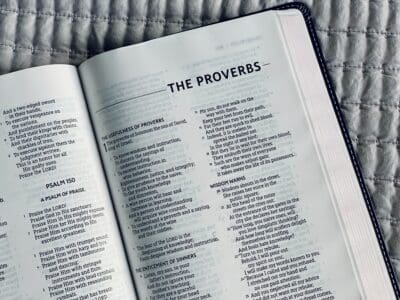“God’s felt friendship in Christ.” It’s a lovely little phrase from the 17th-century Scottish preacher, David Dickson. His point is not simply that Christ makes us His friends, but that this friendship is something that can be felt. Dickson writes: “There is a rock of refuge for safety and comfort to the exiled and perplexed saint, which is able to supply all wants, and to sweeten all sorrows; and this is the rock of God’s felt friendship in Christ.”[1]
Christianity is not simply an intellectual worldview. It’s a living relationship with the living God. That means it is something that can be “felt.” Of course, our experience of God will be on another level in glory. But even now it is a felt friendship. Elsewhere Dickson talks about “felt presence”: “There is more joy in God’s felt presence,” he says, “than grief in felt trouble.”[2]
Experiencing the Presence
“Great,” you might be thinking, “but what does that look like? How do I experience this felt presence of God?” Perhaps our minds go to the mystic encountering God in the silence of contemplation or the charismatic preacher promising a power encounter in a time of ministry. Neither is a route advocated by the Puritans. Again and again in their writings they bring us back to the simple means of grace – the preaching of God’s word and the administration of the sacraments. These are God’s gifts to us that we might feel afresh the power of His promises and the consolation of His love. Dickson speaks of the “public ordinances,” the means of grace ordained by Christ in the gathering of the church: preaching, singing, prayer, communion. All very ordinary. And yet not ordinary at all – supernatural, God-infused activities through which God reassures the fragile, battered hearts of His people.
At one point Dickson writes: “When a man who loveth the public ordinances is debarred from them, and maketh use of private exercises of religion, God can and will supply unto him what he wanteth, and be a little sanctuary unto him.”[3] It’s a wonderful encouragement to private prayer and a delightful picture of God himself being the sanctuary in which we meet him. But can you spot Dickson’s underlying assumption? The private sanctuary is second best. It’s the alternative when someone cannot access “the public ordinances.” Of course, Dickson is not making us choose between them. It’s not an either/or. But it’s clear which comes first; which has the greatest potency to supply our spiritual needs.
Dickson is commenting on Psalm 63 where David is in exile, probably after being deposed by his son, Absalom. It’s part of a set of three psalms that appear to have been written during this period of enforced exile. Commenting on Psalm 61, Dickson says: “When the godly are driven … from exercise of public ordinances, no wonder they fall into perplexity of spirit.”[4] In Psalm 61:4 David longs to “dwell in your tent forever.” It’s a reference to the tabernacle. David longs for the means of grace. For David, under the old covenant, that meant the worship of the tabernacle. For us today it means the gospel communicated verbally in the preaching of God’s word and communicated physically in bread and wine. These means of grace are God’s kind gift to convey a sense of His promises and presence.
The same idea is expressed by the Puritan Thomas Manton:
God is to be sought in his ordinances, such as the word and prayer. Christ walks in the midst of the golden candlesticks. If you would find a man, notice where he usually walks. If you want to find Christ, look for him in the assemblies of his people.[5]
Manton adds, “It is not enough to make Christ the object of the ordinances, to worship him. We must also make him the end or goal of them.” In other words, it is not enough simply to talk about Christ when we meet together as His people – important as that is. What we really want is to meet Christ – to talk to him and hear from him. “It is not enough to make use of ordinances,” says Manton, “we must see if we can find God there … To be pleased with ourselves because we have been in the courts of God, even though we have not met with the living God, is very sad.”[6] So we must come to the ordinances with expectation.
Missing the Opportunity
Yes, there is a danger of chasing experiences. But most of us suffer the opposite threat: an intellectual approach to our Christian life in which service becomes mere duty rather than being energized by experience of Christ.
Part of our problem may be that we have a narrow notion of what an experience of God involves. Ironically, I suspect it’s a notion shaped by the excesses of the charismatic movement. We fear dramatic gatherings full of manipulation or unrealistic promises that leave people disillusioned. In the process we can miss the opportunity to celebrate the simple ways God meets us in His word and sacraments – comforting those feeling battered by life, challenging others in our complacency, reassuring those burdened by guilt.
Preparing to Meet with God
One way of putting this into practice is to follow another Puritan practice – that of preparing for the meeting of God’s people. The Puritans encouraged people to spend some time, perhaps on a Saturday evening or Sunday morning, examining their hearts and committing the upcoming church service to God in prayer. Puritan prayer manuals gave people model prayers for this, including this one from Lewis Bayly:
When I shall, with the rest of the holy assembly,
appear before your presence in your house,
speak to me through the preaching of your word.
Let not my sins stand as a cloud
to stop my prayers from ascending to you,
or to keep back your grace from descending
by your word into my soul.
May I feel today in my heart
the beginning of that eternal Sabbath,
which, in unspeakable joy and glory,
I shall celebrate with saints and angels
to your praise and worship for evermore.[7]
[1] David Dickson, A Commentary on the Psalms (Edinburgh: Banner of Truth, 1959), Volume 1, pp. 361-362.
[2] David Dickson, A Commentary on the Psalms (Edinburgh: Banner of Truth, 1959), Volume 1, p. 324.
[3] David Dickson, A Commentary on the Psalms (Edinburgh: Banner of Truth, 1959), Volume 1, p. 372.
[4] David Dickson, A Commentary on the Psalms (Edinburgh: Banner of Truth, 1959), Volume 1, p. 361.
[5] Adapted from Thomas Manton, “Sermons on Psalms 119,” The Complete Works of Thomas Manton (James Nisbet, 1872), Volume 6, p. 23.
[6] Adapted from Thomas Manton, “Sermons on Psalms 119,” The Complete Works of Thomas Manton (James Nisbet, 1872), Volume 6, p. 23.
[7] From Lewis Bayly, “A Sabbath-Day Prayer,” Into His Presence: Praying the with the Puritan, ed. Tim Chester (London: The Good Book Company, 2022), pp. 128-129.






